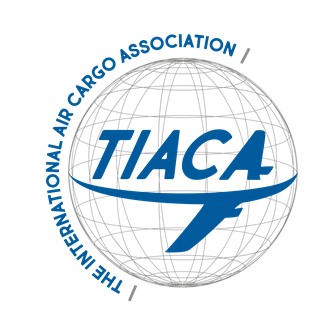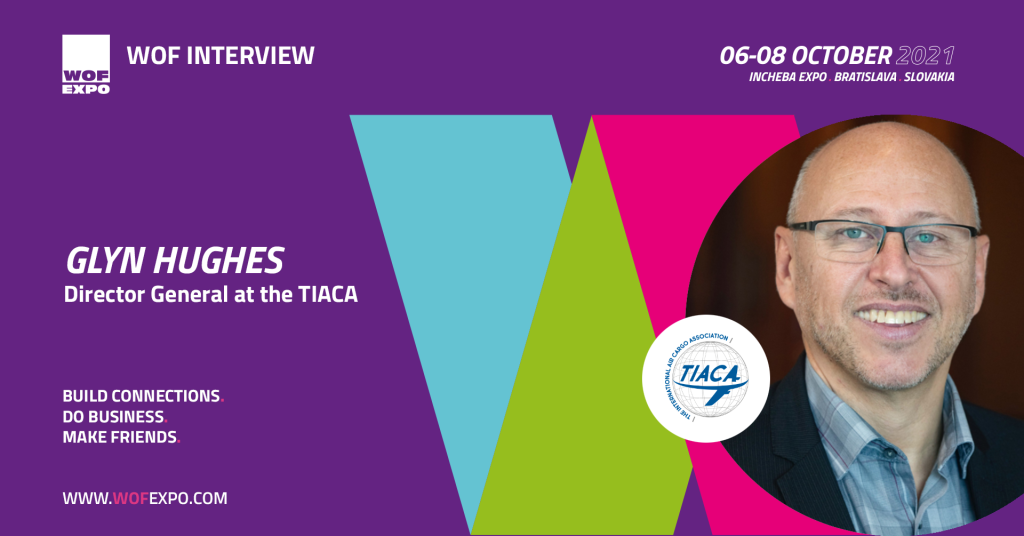Interview with Glyn Hughes
| Mr. Glyn Hughes is Director General at The International Air Cargo Association TIACA. He works with the Board to deliver the organization’s vision for a safe, profitable and united air cargo industry that embraces modern technologies and practices to sustainably and fairly serve trade and social development worldwide. Glyn is dedicated to developing collaborative relationships and is a firm believer in supporting the next generation of industry leaders and innovators. |
| 1. TIACA has the sustainability program at its core. Could you please tell us a little more about your sustainability policy and practises, that you have implemented in order to maintain the highest environment protection criteria? This is such an important question and is one of TIACA’s key programs. We established a task force and developed a TIACA program around People , Planet and Prosperity which are the three cornerstones of our sustainability vision. We belive the industry needs to mirror global society which it serves so we need to have an inclusive and diverse workforce with opportunities for all to develop and achieve their full potential. We need to leave the planet in a better condition than which we found it by adopting responsible enviromental practices and from a prosperity perspective the industry needs to be successful to ensure adequate investment is available and to ensure we support the UN SDGs by helping all national economies achieve their full potential for the improvement and enhanced integration of the global community. 2. Delivery of COVID-19 vaccines has been quite challenging. In your opinion, was the airfreight industry prepared for the vaccine transportation and how does the industry cope with the ever-changing regulations a limited infrastructure? The air cargo industry starting preparing for vaccine distribution as soon a Covid-19 was declared a pandemic. Thankfully the industry has been successfully moving vaccines for a number of years and so we all looked at existing procedures to identify potential shortfalls. The most significant shortfalls were the following; |
- Product sensitivity… Most traditional vaccines moved via conventional cool supply chains, +2-+8c temperature range. Fully planned and with known challenge points. Covid vaccines, of which there were over 240 candidate developments, moved in very different conditions, down to as potentially cold as -80c through to traditional cool chains. Planning therefore become very important.
- Global infrastructure … linked to above, covid vaccines will need to be moved to over 200 countries and territories, many of which have less than ideal infrastructure in place so are not capable of receiving all vaccines.
- Capacity … traditional vaccines quite often moved in the bellies of passenger aircraft, yet with so many passenger routes suspended due to covid the available capacity to second and third tier markets was extremely limited. Flying passenger planes for cargo only operations was one innovation which helped address that situation.
- Scale and reach … The last significant difference was scale. Traditional vaccine programs were planned for in advance, limited in scope and known in terms of shipment sizes. These are all variables which make Covid vaccine movement so challenging.
| The industry has excelled thus far in rising to the challenge. Collaboration is at an all time high as everyone has a common and shared objective. Patient safety… the best way to protect each of us is to protect all of us. 3. Digitalisation of the air cargo industry has experienced a significant boom. What efforts have been made by TIACA in order to innovate and modernise the air cargo transportation processes? We are not a standard setting body so our role is one very much focused on driving adoption through showcasing and highlighting the value and benefits derived from enhanced digitalization. The industry needs to optimize to cater for increased volumes and increased demands for speed and the need for more efficient and effective border controls. Enhanced industry digitalization and information sharing integration is the only way these objectives can be achieved. 4. One of your main goals is to prepare the next generation of industry leaders. Do you offer any training programs for young air cargo enthusiasts? The most successful industries and companies are those which adapt quickest to changing market conditions, the best way to pre-empt upcoming changes is to embrace the next generation of leaders who will shape global society, in terms of consumer behaviours, preferences, impact and direction. It is therefore critical to create the right environment whereby that next generation are drawn to air cargo and logistics. The value of air cargo campaign will be instrumental in this regard. Historically air cargo focused on moving boxes but we now need to focus on what’s inside the box, the impact it will have and how we must provide the right solutions to maximise that impact. We are looking at how we can enhance our activities, in collaboration with industry partners, in this area post covid. 5. What is your opinion about positioning WOF EXPO in Central and Eastern Europe region? Air cargo and logistics touches every corner of the planet and with enhanced ecommerce sales the role of logistics is critical in every country, yet we mostly focus on traditional primary established markets. The location of WOF EXPO is well chosen to ensure the knowledge is spread across a greater area and quality solution providers and potential business partners can have a home to enhance business connectivity. |
 | The International Air Cargo Association (TIACA) represents, supports, informs, and connects every element of the global air freight supply chain. TIACA lobbies governments and regulators, provides valuable networking opportunities, organizes and hosts leading industry events, and gives guidance, advice, and specialist career development training for members.
tiaca.org |

